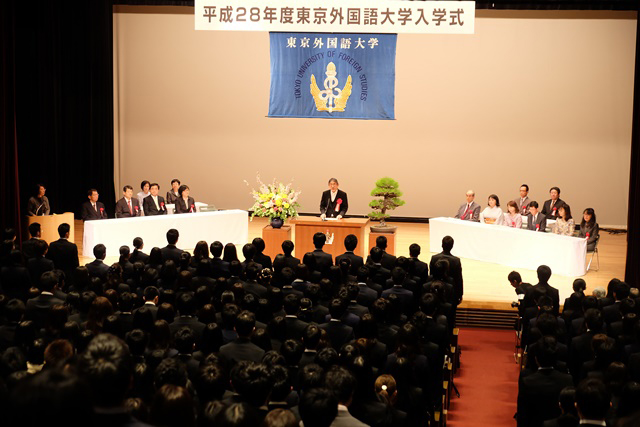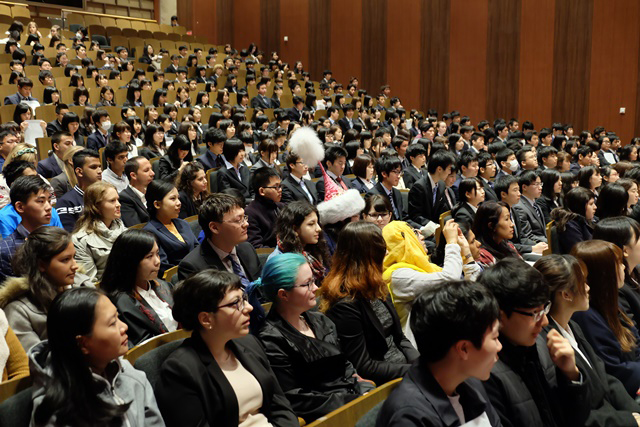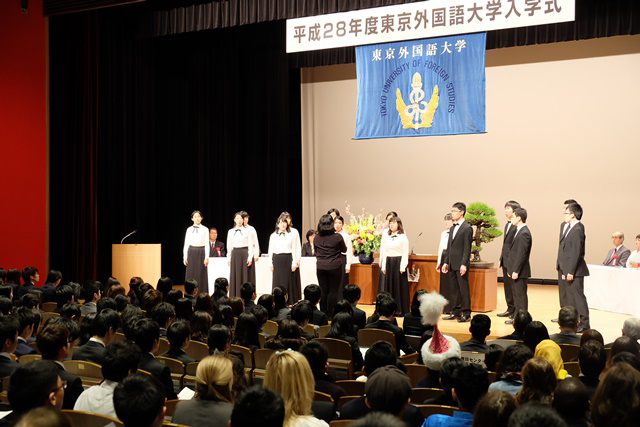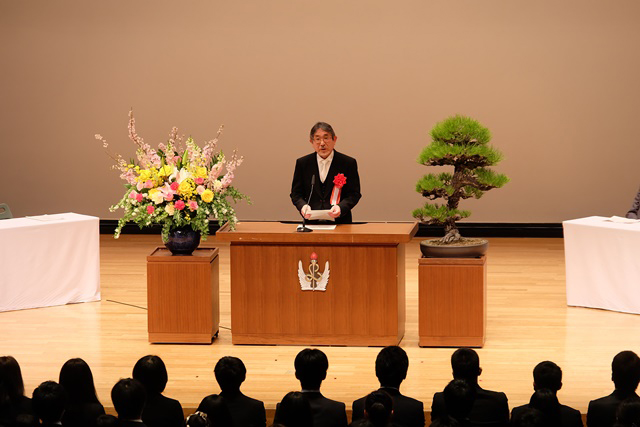Entrance Ceremony for 2016 Academic Year Held on April 3rd
May 9, 2016
On the 3rd of April (Sun), the entrance ceremony for the 2016 academic Year for the School of Language and Culture Studies, School of International and Area Studies, the Graduate School of Global Studies and the Japanese Language Center for International Students was held in the Prometheus Hall inside the Agora Global building here at TUFS.
At the entrance ceremony, the philharmonic choir "Call Soleil" performed the university anthem after which at part one of the ceremony, students from the School of Language and Culture Studies, the Japanese Language Center for International Students, foreign students advancing to undergraduate programs and foreign research students were granted entry to the university whilst permission was also granted for those in the second part consisting of students from the School of International and Area Studies as well as Masters and PHD students from the Graduate School of Global Studies.
President`s Address for the 2016 Academic Year Entrance Ceremony
 | |
 |  |
President`s Address for the 2016 Academic Year Entrance Ceremony

As the president, I represent Tokyo University of Foreign Studies and am happy to welcome you into this fine establishment of learning. Also to all the parents and guardians who are listening to this from the multimedia hall room 101 in the Research and Lecture building, I warmly welcome you to the graduation ceremony of your loved ones.
Today, here in this hall, we are welcoming 413 new students (including 16 transfer students) of the School of Language and Culture Studies, 426 new students (including 16 transfer students) of the School of International and Area Studies, 163 new students of the Graduate School of Global Studies Masters and PHD programs and also 64 new students of the Japanese Language Center for International Students. With all of you brimming with hope right before me I cannot help but feel a little tense.
Tokyo University of Foreign Studies, which will become your new place of study, can be traced back to its roots in 1857 when it was opened by the Institute for the Investigation of Foreign Literature. Then in 1873, beginning with 5 departments which included English, German, French, Russian and Chinese, Tokyo University of Foreign Studies was established. This year is considered to be the "founding year" of the university. Following this, through ups and downs, the school was officially recognized as a commercial higher education institute and was affiliated with the status of foreign language school in 1897 shortly before becoming a completely independent institution in 1899. After which, in 1949 alongside the launch of the new university system, Tokyo University of Foreign Studies was off to a fresh new start. At the time, there were 12 different departments within the university however, from 2012 the Faculty of Foreign Studies was reformed, the School of Language and Culture Studies and School of International and Area Studies were set up boasting and education system containing 14 regions and 27 languages from around the world. In addition, here at TUFS, we have the Graduate School of Global Studies where various languages and cultures from around the world can be comprehensively researched, the Research Institute for Languages and Cultures of Asia and Africa which is the joint research center being used on a national level and also the Japanese Language Center for International Students which is the joint base for Japanese language education.
In September of the year before last, the "Super Global University Creative Support" project managed by the Ministry of Education, Culture, Sports, Science and Technology adopted our initiative "From the world to Japan, from Japan to the world -the University network core to provide global human resources and knowledge" propelling towards globalization and putting in effort to make this initiative a reality. As an outstanding humanities and social sciences education and research center, TUFS is aiming to become an educational institute which "Contributes towards a united global society capable of coexisting through dialog and mutual understanding between differing cultures based on an understanding of regions and languages".
Now then, please bear in mind that the English title of the university is "Tokyo University of Foreign Studies" and not "Tokyo University of Foreign Languages". This title has been used since the launch of the new university system in 1949. The reason why it is "Foreign Studies" is quite simple, it is the concept that "languages of the world and the cultures that form their base", only when you study them alongside one another you are able to acquire the "high level of education required to play an active role on an international level".
So the educational concept "Foreign Studies" was newly established and inherited by all of the "Foreign Language Universities" nationwide. In total there are 7 across the country which all came together 2 years ago and formed the "National Foreign Studies Alliance" which decided to make the following; "Through the study of specialized and academic research of the world's various regions, Languages and cultures, we aim to nurture people of talent who will contribute to the world as members of an international society" their charter. Then in November of last year, following the initiative of Beijing Foreign Studies University, TUFS, Hankuk University of Foreign Studies, Moscow State Linguistic University and the 17 Foreign Studies Universities in China formed the "Global Consortium for Foreign Studies Universities". Also this year, following the initiative of Hankuk University of Foreign Studies, including TUFS, 11 primary Foreign Studies Universities from Korea, China, Mongolia, Vietnam and Uzbekistan formed the "Consortium for Asian Universities of Foreign Studies".
This kind of activity in the 21st century during the development of globalization, of course demands the acquisition of English ability, but we must also acquire skills in languages from different regions around the world which is evidence that the concept "deepening our understanding of the various regions of the world through languages" is becoming a more and more vital component. All of you here will undoubtedly study hard in Foreign Studies of which Language Studies and Area Studies become the 2 integral pillars. I am greatly anticipating the results of your activities as global multi-lingual people of talent in the future in various regions of the world making full use of your English, regional language ability and cross cultural understanding.
Now then, in order for you all to become "global multi-lingual men and women of talent" who play an active role in a global society, you need to bear in mind that there are already 3 walls you must first overcome. These walls are "Nation", "Discipline" and "Culture". Currently, on a global scale, people, goods, money and information are constantly moving, which means there is a need to think and act outside the walls of our national border. In other words, an international attitude is essential.
In a world where globalization is progressing, being able to deal with the various problems that arise requires you to have the interdisciplinary and specialist field knowledge base and thought process. In other words an "interdisciplinary" attitude is essential.
Currently, in the global society the movement of people who have overcome the national borders is rapidly accelerating. This is causing friction between regional societies at a level previously unseen. In order to be able to deal with immigration and refugee problems it can be said that wisdom and perseverance to accept religious beliefs, lifestyle patterns and values that differ to your own. In other words, in the 21st century, there is a necessity to overcome the wall of "Culture", understand differing cultures and persevere to create a multicultural world. In other words, an "Intercultural" attitude is essential.
I hope that through your studies here at TUFS you will develop into "International", "Interdisciplinary" and "Intercultural" global citizens.
English Message for Foreign Students Studying Abroad in Japan
Finally, I would like to say a few words to everyone who will be entering the Japanese Language Center for International Students.
Lastly, I would like to say congratulations to our new students here at Japanese Language Center for International Students.
JLC is a leading Japanese language educational institution established in 1970. It has been under the Joint Usage Center for Education, since 2012.
It is my most sincere wish that your Japanese language abilities blossom while here at JLC. May you take the language and culture learned here at JLC and move on to your own area of expertise.
Finally, I hope that in the future you may become a bridge between Japan and your own place. Thank you.
This concludes my ceremonial address
03/04/2016 National University Corporation, Tokyo University of Foreign Studies, President Hirotaka Tateishi
